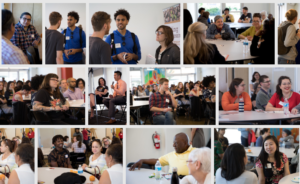
News + Events
By Victoria Kaplan
If you are intrigued by SJF, and want a clearer understanding of the challenges and opportunities of building a base for substantive change, the best thing you can do is attend a grantee summit.
I met SJF when it was still ATR, at a time of transition from its groundbreaking beginning with a small group of investors, through its evolution to the strikingly egalitarian community it is now. I participated in an early giving circle and was curious to learn how this process has evolved.

The opening plenary session at the May 12 Seattle event, was attended by about 125 people. The session was led by Mijo Lee, SJF executive director, was a conversation with grantees Micah Nielsen from Montana Women Vote and Huy Ong from OPAL Environmental Justice Oregon. The format enabled Micah and Huy to “show by telling” that thinking deeply about the root causes of disparity – as opposed to thinking about symptoms – can lead communities to long-term, systemic change. Effective organizing helps people build a collective vision.
Whether it’s a lack of transit access for low-income communities of color in Portland, or increasing the number of women voters in Montana, the strategies that work best reflect the same thinking about what effective organizing can do:
- People most immediately impacted by an issue develop resources, skills, and confidence
- They show up to tell lawmakers about the ways legislative change affects them
- The success rate for long-term positive, equitable change improves dramatically
When constituents become visible and have an opportunity to tell personal stories to powerful decisionmakers, and keep showing up to tell those stories, legislators are more likely to respond positively. When women from East Missoula drove to Helena to say out loud “people in suits don’t care about poor people,” they began to see results.
When bus riders in Portland did a feasibility study on what it would mean to make the bus system more effective for poor folks, and gave lawmakers a chance to talk directly to constituents whose lives they affected, it raised their probability for success in getting what they needed.
The Criminal Justice panel members/grantees brought confirmation of what we heard during the plenary session, and added their own views on base building.
Anna So from Critical Resistance PDX reported on the ways Critical Resistance works with people who are involved in police issues including houseless people and people inside prisons. Their focus is on abolishing the prison industrial complex.
Shar Litchy from the Peace and Justice Action League of Spokane gave us a sense of their work to end racial disparities and win non-jail solutions and non-arrest solutions, to stop the cycle of crime, save money, and change lives. They are also focused on moving to end the death penalty.
Shujat Qalbani from Unite Oregon told us how they develop coalitions working on criminal justice reform to create a more restorative model. Unite Oregon is led by people of color to create criminal justice policies that are accountable to the entire community.
For me, the two most important pieces of information from this panel were:
How important SJF funding is so they can organize and strategize instead of spending all their time fundraising, and it’s vital to be patient and keep at the work. Effective social change takes a long-term commitment and building a large base of support is what’s beginning to shift the power. There are small victories along the way, there are many gifts that come from working together in community, and it takes grit, tenacity and love to keep moving forward.
Victoria Kaplan is a longtime member and supporter of SJF.